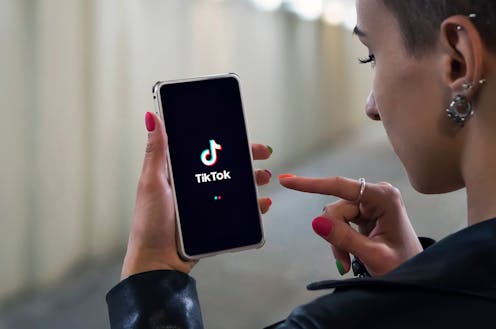
The wildly popular app, TikTok started off as a platform to create musical, lip-syncing and dance videos. The pandemic helped the app grow as more and more people were searching for something to do while stuck at home. And right now, it’s not just well-loved, it’s the most downloaded app in the world.
For the most part, it’s used by people under the age of 30. TikTok is a highly addictive video sharing platform with a lot of lively music and dance videos that encourages participation and replication. Think macarena times 100 million. For many people it sounds like a frivolous waste of time.
But the app has revealed itself to have more depth than initially meets the eye. TikTok can be a place to learn, become politically aware and even discover new things about yourself.
Scrolling through, you can find a science lesson on climate change from Bill Nye the science guy. You can find lessons on Indigenous languages. How to dress for your body type. Or up to date news and election coverage.
While the app definitely has its downsides – its upsides are worth paying attention to.
On this week’s episode of Don’t Call Me Resilient, we explore how TikTok is helping its users build strong communities, and also how the app’s algorithm is treating marginalized folks and their stories.
Producer Haley Lewis speaks with Jessie Loyer, Indigenous librarian from Mount Royal University and TikTok micro-influencer about TikTok’s potential as a tool for education.
And Vinita chats with Crystal Abidin, associate professor in the School of Media, Creative Arts and Social Inquiry at Curtin University in Perth, Australia. She is the founder of TikTok Cultures, a global TikTok research hub. Also joining the conversation is Jas Morgan, assistant professor of English at Toronto Metropolitan University and facilitator of the Digital Wahkohtowin & Cultural Governance Lab.
Transcript
An unedited transcript of the episode is available here.
ICYMI — Articles published in The Conversation
- Want to learn a language? Try TikTok
- ‘OK Boomer’: How a TikTok meme traces the rise of Gen Z political consciousness
- #MeToo on TikTok: Teens use viral trend to speak out about their sexual harassment experiences
- WitchTok: the rise of the occult on social media has eerie parallels with the 16th century
- How modern witches are enchanting TikTok
- Dads’ time to shine online: How laughter can connect and heal
- ADHD in adults: what it’s like living with the condition – and why many still struggle to get diagnosed
- Love it or hate it, TikTok is changing the music industry
- Is mathematics real? A viral TikTok video raises a legitimate question with exciting answers
Additional Reading + Listening
- TikTok Cultures, a global TikTok research hub founded by Crystal Abidin
- Digital Wahkohtowin and Cultural Governance Lab, facilitated by Jas Morgan
- Indigenous TikTok Is Transforming Cultural Knowledge, written by Jessie Loyer for Canadian Art
- Podcast: Crystal Abidin talks Douyin and TikTok
- TikTok is a thriving learning community—and may be the future of education, Fast Company
- TikTok accidentally detected my ADHD. For 23 years everyone missed the warning signs, The Guardian
- How TikTok changed the world in 2020, BBC Culture
- Utilizing TikTok and Systems Thinking to Facilitate Scientific Public Engagement, by Clare Hayes, Katherine Stott, Katie J. Lamb and Glenn A. Hurst
- TikTok as a Window Into Youth Experiences of Online Learning, by rIoana Literat
- Using TikTok in Education: A Form of Micro-learning or Nano-learning?, by Zuheir N Khlaif and Soheil Salha
- Incorporating Social Media into the Classroom, by Sara Solomon
- How adolescents use TikTok as a digital backchanneling medium to speak back against institutional discourses, by William Terrell Wright
Follow and listen
You can listen to or follow Don’t Call Me Resilient on Apple Podcasts, Google Podcasts, Spotify or wherever you listen to your favourite podcasts. We’d love to hear from you, including any ideas for future episodes. Join The Conversation on Twitter, Facebook, Instagram and TikTok and use #DontCallMeResilient.
Don’t Call Me Resilient is a production of The Conversation Canada. This podcast was produced with a grant for Journalism Innovation from the Social Sciences and Humanities Research Council of Canada. The series is produced and hosted by Vinita Srivastava. The coproducer on this episode is Haley Lewis. Our associate producer is: Vaishnavi Dandekar. Our sound producer is Lygia Navarro. Reza Dahya is our sound designer. Jennifer Moroz is our consulting producer. Lisa Varano is our audience development editor and Scott White is the CEO of the Conversation Canada.
* This article was originally published at The Conversation

0 Comments